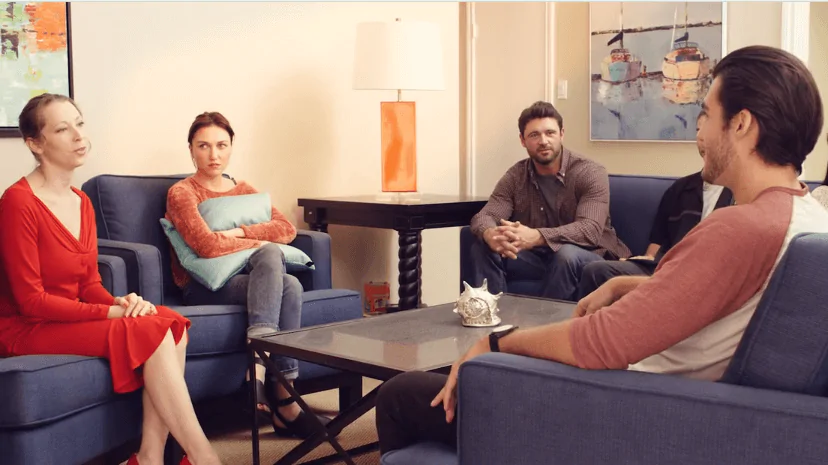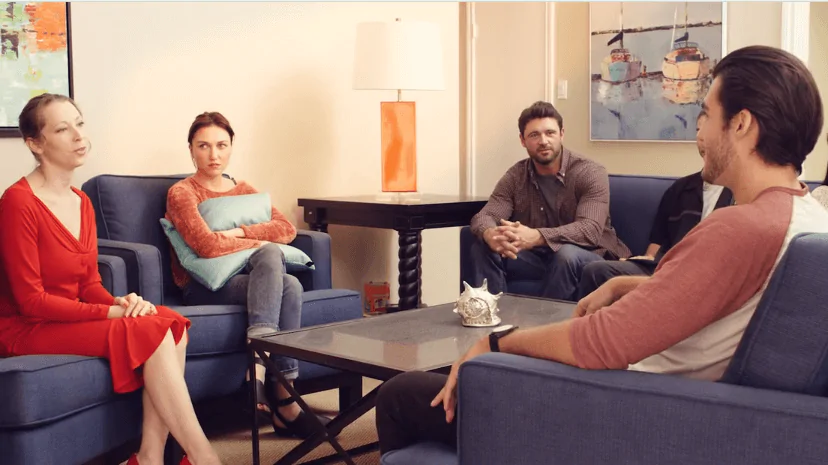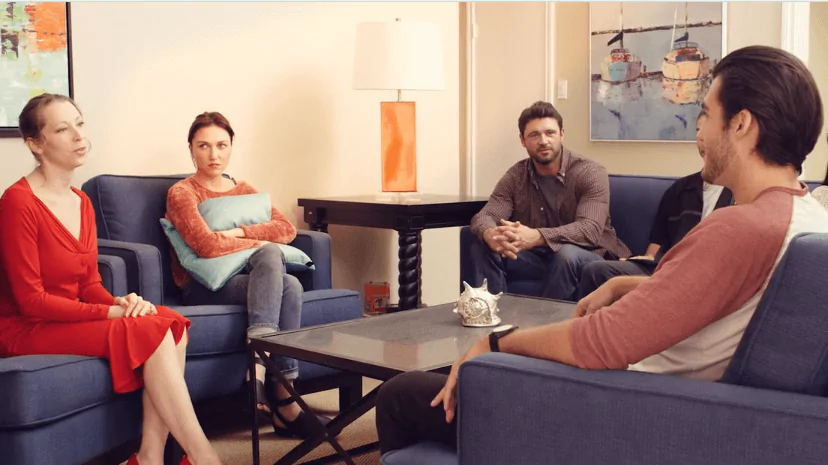24/7 Helpline:
(866) 899-221924/7 Helpline:
(866) 899-2219
Learn more about Individual Therapy centers in Milwaukee
Individual Therapy in Other Cities
Other Categories in Milwaukee

Other Insurance Options

Private insurance

PHCS Network

Meritain

UnitedHealth Group

Anthem

AllWell

ComPsych

Self-pay options

Amerigroup

Absolute Total Care

Ambetter

Sutter

Excellus

Holman Group

Humana

Cigna

BHS | Behavioral Health Systems

WellPoint

Choice Care Network

United Health Care

Great Lakes Adult & Teen Challenge
Great Lakes Adult & Teen Challenge is a faith-based addiction treatment center located in Milwaukee,...

Shorehaven Counseling Associates
Shorehaven Counseling Associates is a private rehab located in Milwaukee, Wisconsin. Shorehaven Coun...

Meta House – Outpatient
Meta House – Outpatient is a private rehab located in Milwaukee, Wisconsin. Meta House – Outpatient ...

Matt Talbot Recovery Center
Matt Talbot Recovery Center is a private rehab located in Milwaukee, WI. Matt Talbot Recovery Center...

Roots Counseling Services
Roots Counseling Services, in Milwaukee, Wisconsin, is an integrative drug and alcohol rehab for adu...

American Behavioral Clinic – West Bluemount Road
American Behavioral Clinic – West Bluemount Road is a private rehab located in Milwaukee, Wisconsin....

Wheaton Franciscan Behavioral Health – West Chambers Street
Wheaton Franciscan Behavioral Health – West Chambers Street is a private rehab located in Milwaukee,...

Genesis Behavioral Health – Outpatient
Genesis Behavioral Health – Outpatient is a private rehab located in Milwaukee, Wisconsin. Genesis B...

Childrens Service Society – Milwaukee
Childrens Service Society – Milwaukee is a private rehab located in Milwaukee, Wisconsin. Childrens ...

Gateway to Change
Gateway to Change is a private rehab located in Milwaukee, Wisconsin. Gateway to Change specializes ...

Aurora Behavioral Health Center – Northshore Programs
Aurora Behavioral Health Center is a hospital-based clinic that offers therapeutic treatment in a fl...

10th Street Comprehensive Treatment Center
10th Street Comprehensive Treatment Center is a drug and alcohol rehab located in Milwaukee, Wiscons...

WestCare – Harambee Community Center
WestCare – Harambee Community Center is a non-profit rehab located in Milwaukee, Wisconsin. WestCare...

Forward Choices
Forward Choices is a private rehab located in Milwaukee, Wisconsin. Forward Choices specializes in t...

American Behavioral Clinic – West Layton Avenue
American Behavioral Clinic West Layton Avenue provides dual-diagnosis addiction treatment services i...

QAM – Quality Addiction Management
QAM – Quality Addiction Management is a private rehab located in Milwaukee, Wisconsin. QAM – Quality...

IMPACT
IMPACT is a non-profit rehab located in Milwaukee, Wisconsin. IMPACT specializes in the treatment of...

Pastoral Counseling Service
Pastoral Counseling Service is a private rehab located in Milwaukee, Wisconsin. Pastoral Counseling ...

Aurora Psychiatric Hospital
Aurora Psychiatric Hospital is a reputable dual diagnosis behavioral health treatment facility locat...

Aurora Family Services
Aurora Family Services is a private rehab located in Milwaukee, Wisconsin. Aurora Family Services sp...

Twelve Step Club
Twelve Step Club is a non-profit rehab located in Milwaukee, Wisconsin. Twelve Step Club specializes...

ARO Counseling Centers – Milwaukee
ARO Counseling Centers – Milwaukee is a private rehab located in Milwaukee, Wisconsin. ARO Counselin...

Great Lakes Women’s Rehab
The Great Lakes Women’s Rehab knows facing life-controlling problems such as drug and alcohol addict...

Saint Lukes Medical Center – Behavioral Health
Saint Lukes Medical Center – Behavioral Health is a private rehab located in Milwaukee, Wisconsin. S...

AMRI Counseling Services
AMRI Counseling Services is a private rehab located in Milwaukee, Wisconsin. AMRI Counseling Service...

Horizon House – Milwaukee
Horizon House – Milwaukee is a private rehab located in Milwaukee, Wisconsin. Horizon House – Milwau...

Martin Luther King Heritage Center – Behavioral Health
Martin Luther King Heritage Center – Behavioral Health is a private rehab located in Milwaukee, Wisc...

River Shore Comprehensive Treatment
River Shore Comprehensive Treatment is a leading provider of medication assisted treatment, offers c...

Renew Counseling Services
Renew Counseling Services is a private rehab located in Milwaukee, Wisconsin. Renew Counseling Servi...

The Salvation Army Adult Rehabilitation Center
The Salvation Army Adult Rehabilitation Center houses men across the state who are struggling with c...

Affiliated Wellness Group
Affiliated Wellness Group is a mental health and substance abuse clinic that offer cutting edge psyc...

Serenity Inns
Serenity Inns provides a safe place for men to recover from their addiction to either drugs or alcoh...

Great Lakes Men’s Rehabs
The Great Lakes Men’s Rehab Center of Hope is considered one of the top Adult & Teen Challenge facil...

First Step Community Recovery Center
First Step Community Recovery Center, located in Milwaukee, Wisconsin, is a detox alcohol and drug a...

Project RETURN – Changes Support Groups
Project RETURN - Changes Support Groups offers three groups to individuals not referred by the Depar...

ARC Community Services
ARC Community Services is a 13-bed residential program for women under correctional supervision who ...

Benedict Center
The Benedict Center provides community-based substance abuse and mental health treatment, education,...

West Milwaukee Comprehensive Treatment Center
West Milwaukee Comprehensive Treatment Center is a private rehab located in Milwaukee, Wisconsin. We...



























Meta House – Riverwest North
Meta House, based in Milwaukee, Wisconsin, stands as a pioneering institution in providing holistic ...

MD Therapy
MD Therapy is a private rehab located in Milwaukee, Wisconsin. MD Therapy specializes in the treatme...

The Cedars Drug and Alcohol Rehab
The Cedars Drug and Alcohol Rehab is a private rehab located in Milwaukee, Wisconsin. The Cedars Dru...

ARO Counseling Centers
ARO Counseling Centers is a private rehab located in Milwaukee, Wisconsin. ARO Counseling Centers sp...

Covenant Rehabilitation Services
Covenant Rehabilitation Services is a private rehab located in Milwaukee, Wisconsin. Covenant Rehabi...

Milwaukee County Psychiatric Crisis Services
Milwaukee County Psychiatric Crisis Services is a public rehab located in Milwaukee, Wisconsin. Milw...

Imani Alcoholism and Treatment
Imani Alcoholism and Treatment is a private rehab located in Milwaukee, Wisconsin. Imani Alcoholism ...

American Indian Council on Alcoholism
American Indian Council on Alcoholism offers outpatient treatment for individuals with alchol and/or...

Meta House
Meta House is a non-profit rehab located in Milwaukee, Wisconsin. Meta House specializes in the trea...

Crack Treatment Recovery First
Crack Treatment Recovery First is a private rehab located in Milwaukee, Wisconsin. Crack Treatment R...

Rawhide Youth and Family Counseling
Rawhide Youth and Family Counseling is a private rehab located in Milwaukee, Wisconsin. Rawhide Yout...

CA McReynolds and Associates
CA McReynolds and Associates is a private rehab located in Milwaukee, Wisconsin. CA McReynolds and A...

Bell Therapy – Day One
Bell Therapy – Day One is a private rehab located in Milwaukee, Wisconsin. Bell Therapy – Day One sp...

Omni Enrichment
Omni Enrichment is a private rehab located in Milwaukee, Wisconsin. Omni Enrichment specializes in t...

Genesis Behavioral Health – Milwaukee
Genesis Behavioral Health – Milwaukee is a private rehab located in Milwaukee, Wisconsin. Genesis Be...

Saint A
Saint A is a private rehab located in Milwaukee, Wisconsin. Saint A specializes in the treatment of ...

Covenant Behavioral Health
Covenant Behavioral Health is a private rehab located in Milwaukee, Wisconsin. Covenant Behavioral H...

Fokus Family Services
Fokus Family Services is a private rehab located in Milwaukee, Wisconsin. Fokus Family Services spec...

The Power Of Change Behavioral Services
The Power Of Change Behavioral Services is a private rehab located in Milwaukee, Wisconsin. The Powe...

AA – Alcoholicos Anonimos – Grupo Renacimento
AA – Alcoholicos Anonimos – Grupo Renacimento is a non-profit rehab located in Milwaukee, Wisconsin....

Transformation Services
Transformation Services is a private rehab located in Milwaukee, Wisconsin. Transformation Services ...

Childynamics – Day Treatment and Outpatient Center
Childynamics – Day Treatment and Outpatient Center is a private rehab located in Milwaukee, Wisconsi...

Cedar House
Cedar House is a private rehab located in Milwaukee, Wisconsin. Cedar House specializes in the treat...

Behavioral Health Services
Behavioral Health Services is a private rehab located in Milwaukee, Wisconsin. Behavioral Health Ser...

Bell Therapy – Belwood
Bell Therapy – Belwood is a private rehab located in Milwaukee, Wisconsin. Bell Therapy – Belwood sp...

Associated Counseling and Training Services
Associated Counseling and Training Services is a private rehab located in Milwaukee, Wisconsin. Asso...

Genesis Detox
Genesis Detox is a private rehab located in Milwaukee, Wisconsin. Genesis Detox specializes in the t...

Sebastian Family Psychology Practice
Sebastian Family Psychology Practice is a private rehab located in Milwaukee, Wisconsin. Sebastian F...

Genesis Behavioral Health
Genesis Behavioral Health is a private rehab located in Milwaukee, Wisconsin. Genesis Behavioral Hea...

Park West Social and Psychotherapy
Park West Social and Psychotherapy is a private rehab located in Milwaukee, Wisconsin. Park West Soc...

Discovery and Recovery Clinic
Discovery and Recovery Clinic is a private rehab located in Milwaukee, Wisconsin. Discovery and Reco...

Genesis Behavioral Health – Residential
Genesis Behavioral Health – Residential is a private rehab located in Milwaukee, Wisconsin. Genesis ...

AA – Alcoholicos Anonimos
AA – Alcoholicos Anonimos is a non-profit rehab located in Milwaukee, Wisconsin. AA – Alcoholicos An...

Genesis Behavioral Services – Detox Center
Genesis Behavioral Services – Detox Center is a private rehab located in Milwaukee, Wisconsin. Genes...

Meta House – Women and Children
Meta House – Women and Children is a reputable dual-diagnosis addiction treatment rehab in Milwaukee...

Milwaukee County Behavioral Health
Milwaukee County Behavioral Health is a public rehab located in Milwaukee, Wisconsin. Milwaukee Coun...

AA – Alcoholicos Anonimos – Oficiana Intergrupal
AA – Alcoholicos Anonimos – Oficiana Intergrupal is a non-profit rehab located in Milwaukee, Wiscons...

Rogers Behavioral Health – Brown Deer Outpatient Center
Rogers Behavioral Health - Brown Deer Outpatient Center is a mental health and addiction treatment p...

Lutheran Social Services – Counseling
Lutheran Social Services – Counseling is a private rehab located in Milwaukee, Wisconsin. Lutheran S...

Child Adolescent Family and Marriage Therapy
Child Adolescent Family and Marriage Therapy is a private rehab located in Milwaukee, Wisconsin. Chi...

Aloria Health
Aloria Health inspires a new standard of eating disorder care that empowers the individual, family a...

Positive Outlook Clinical Services – Milwaukee
Positive Outlook Clinical Services – Milwaukee is a private rehab located in Milwaukee, Wisconsin. P...

Rawhide Youth and Family Counseling
Rawhide Youth and Family Counseling is a non - profit rehab located in Milwaukee, WI. Rawhide Youth ...

Shorehaven Behavioral Health
Shorehaven Behavioral Health is a private rehab located in Milwaukee, Wisconsin. Shorehaven Behavior...

Community Services – Unlimited Potential
Community Services – Unlimited Potential is a private rehab located in Milwaukee, Wisconsin. Communi...














